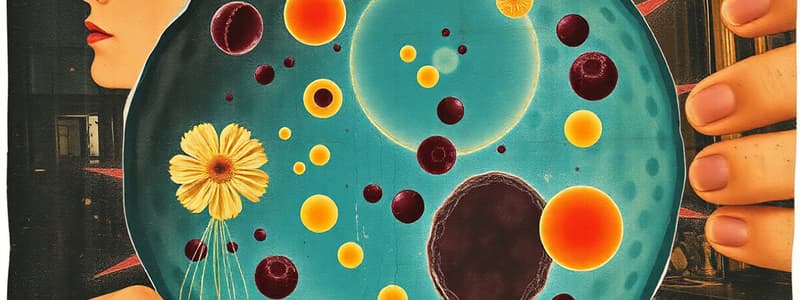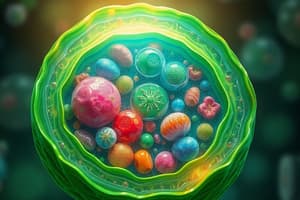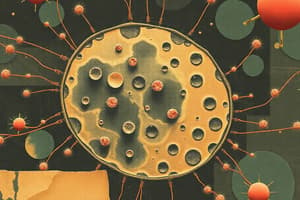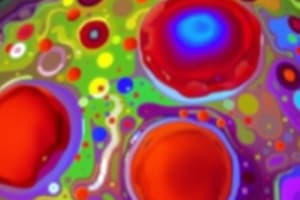Podcast
Questions and Answers
What is the primary function of the smooth endoplasmic reticulum?
What is the primary function of the smooth endoplasmic reticulum?
- Energy production
- Protein synthesis
- Hormone and steroid synthesis (correct)
- Photosynthesis
What structure is responsible for chemically modifying and packaging substances for secretion?
What structure is responsible for chemically modifying and packaging substances for secretion?
- Chloroplasts
- Nucleus
- Golgi apparatus (correct)
- Mitochondria
Which organelle is specifically known for energy release in the form of ATP?
Which organelle is specifically known for energy release in the form of ATP?
- Ribosome
- Mitochondria (correct)
- Chloroplast
- Endoplasmic reticulum
What role do chloroplasts play in plants?
What role do chloroplasts play in plants?
Which of the following statements about cell specialization is TRUE?
Which of the following statements about cell specialization is TRUE?
What kind of tissue is blood classified as?
What kind of tissue is blood classified as?
Which organelle contains thylakoids and chlorophyll?
Which organelle contains thylakoids and chlorophyll?
What is the primary role of the vacuole in plant cells?
What is the primary role of the vacuole in plant cells?
What is the primary function of the cell surface membrane?
What is the primary function of the cell surface membrane?
Which of the following correctly describes the structure of the nucleus?
Which of the following correctly describes the structure of the nucleus?
What characterizes the rough endoplasmic reticulum?
What characterizes the rough endoplasmic reticulum?
What is the role of ribosomes within the cytoplasm?
What is the role of ribosomes within the cytoplasm?
In plant cells, which structure provides support and protection?
In plant cells, which structure provides support and protection?
Which organelle is known for producing energy through cellular respiration?
Which organelle is known for producing energy through cellular respiration?
What is the primary function of the Golgi apparatus?
What is the primary function of the Golgi apparatus?
Which component is found in plant cells but not in animal cells?
Which component is found in plant cells but not in animal cells?
Flashcards are hidden until you start studying
Study Notes
Overview of Cells
- Cells serve as the fundamental building blocks of all living organisms.
- Contain protoplasm, consisting of the cell surface membrane, cytoplasm, and nucleus.
Protoplasm Components
-
Cell Surface Membrane:
- Selectively permeable, regulates substance movement in/out.
- Acts as receptor sites for external stimuli.
- Composed of proteins and phospholipids; defines cell boundary.
-
Cytoplasm:
- Aqueous medium housing various organelles.
-
Nucleus:
- Houses hereditary material (DNA) organized as chromatin and chromosomes.
- Surrounded by a nuclear membrane with pores for selective transport.
- Controls cell activities including growth and division.
-
Cell Wall (Plant Cells Only):
- Rigid structure made of cellulose; provides support and protection.
- Can undergo lignification and is fully permeable.
Organelles and Their Functions
-
Rough Endoplasmic Reticulum (RER):
- Studded with ribosomes; specializes in protein synthesis and transport.
-
Smooth Endoplasmic Reticulum (SER):
- Lacks ribosomes; involved in lipid and hormone synthesis, detoxification.
-
Golgi Apparatus/Body:
- Stack of membrane-bound sacs; modifies, stores, and packages proteins for secretion.
-
Ribosomes:
- Composed of ribosomal RNA; synthesizes proteins either as secretory or intra-cellular.
-
Mitochondria:
- Double-membrane organelle; produces ATP, essential for energy metabolism.
- Abundant in energy-demanding cells; can contain thousands in highly active cells.
-
Chloroplasts (Plant Cells Only):
- Double-membrane organelle containing thylakoids with chlorophyll for photosynthesis.
- Converts sunlight into glucose and stores starch.
-
Vacuoles:
- Fluid-filled organelles; provide structural support to plant cells and store waste and nutrients.
Cell Specialization
-
Differentiation:
- Process where cells develop specialized structures for specific functions.
-
Tissues:
- Composed of similar cells; Simple tissues consist of the same cell type (e.g., muscular tissue).
- Complex tissues, like blood, include multiple cell types.
-
Organs:
- Consist of various tissues that work collaboratively for specific functions (e.g., stomach integrates gland, muscle, and nerve tissues).
Studying That Suits You
Use AI to generate personalized quizzes and flashcards to suit your learning preferences.




